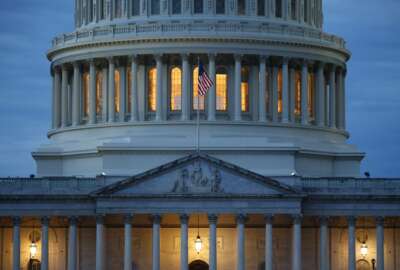

The House tucks into two weeks of committee work that includes appropriations for fiscal 2021 in addition to another possible stimulus bill.
Best listening experience is on Chrome, Firefox or Safari. Subscribe to Federal Drive’s daily audio interviews on Apple Podcasts or PodcastOne.
Summertime — and the living isn’t so easy. The House of Representatives tucks into two weeks of committee work. That includes appropriations for fiscal 2021 in addition to another possible stimulus bill. With our weekly look ahead, Federal Drive with Tom Temin turned to Bloomberg Government Editorial Director Loren Duggan.
Interview transcript:
Tom Temin: Let’s begin by clarifying terms here. Are they on recess? Are they on committee work? What the heck, where are they and what are they doing?
Loren Duggan: So they often call their recess periods district work time, or in this case, they’re calling it a committee work period. And I think that’s a fair description. Although the House and Senate chambers are out for the next two weeks except for pro forma quick sessions just gavel in-gavel out, in particular, the appropriators are going to be hard at work. They are trying to get through all the work that they normally do over several months into basically a two week period and try to turn through all their bills. The Senate is at a little bit more ease than that. There are fewer hearings there. But you know, this is part of the change in schedule due to the coronavirus and an attempt to get a lot of work done now before we get to the fall season, which is already shortened for legislative work because of the election. So it’s been a very weird year for the calendar and these next two weeks, I think will will be part of that strange time.
Tom Temin: And just a question on process here because the Senate has differed, being under republican control that the House, with respect to voting remotely, and the Senate won’t have it, the House has it over republican objections. What about markups and those kinds of meetings, are those being virtual or some of the people meeting in the committee rooms and whatever?
Loren Duggan: It’s sort of hybrid because you do have members sitting in the committee rooms and oftentimes not their normal committee rooms, they’re going to bigger spaces that can accommodate more people and allow them to space out with people voting both in the chamber and then remotely either from their offices, it could even be back at home in some cases. On the floor, the House has proxy voting so you can designate another member to cast a vote on your behalf. But as we’ve seen, even with that proxy schedule or proxy rule in place, these votes are taking a long time in the House floor because they’re voting in small groups going in casting votes leaving so another group can come in. So the voting procedures in the house are very different right now. The Senate as you note, they’re still coming in voting aye or no up or down with their hand and moving on. So a little bit different. We’ve seen other places, including around the world where there’s been more of a remote system, but there’s still a lot of somebody has to be there to cast a vote on the House floor, even if it’s not everyone.
Tom Temin: So let’s get down to the business they’re actually dealing with, and appropriations work in the house actually start today.
Loren Duggan: That’s right. They’re going to get through all this subcommittee work in three days. Again, that’s something that usually takes base over a couple of weeks, but three bills today, five tomorrow, four on Wednesday, get through all of those — and then on Thursday, they’re going to start with the full committee process going through that same list of bills and allowing the larger committee to have a chance to work those bills in the direction they’d like to see. So it’ll be interesting to see what sort of fights we have this year. You know, there’s a lot of issues out there. One thing that’s not in dispute this year between the House and the Senate is how much to spend in total, that spending cap deal that we got last year covers this year as well. So while they have to argue over how much to put into each bill, and then allocate that out among the different departments and agencies, if they can come to a quick agreement on that and figure out what to do about the controversial policy writers, this could be an easier season, although there was already some chatter last week and particularly among people who watch this about when are we going to see the CR that will keep the government funded after September 30 ad what will be in that because it probably will be hard to get through all these bills, get them through the floor, and both chambers. So there’s a long way to go here on this, but we’re getting to the really meat of it starting today.
Tom Temin: But typically, it is the House that gets through its appropriations bills on time, it’s the Senate that’s usually the last minute rush.
Loren Duggan: Yes. And you know, the Senate does do a pretty good job of getting through the committee work on the bills, although floor time in the Senate is hard to come by. Usually if they can’t preagree something, it’s really hard to put it on the floor. So one of my questions going forward is going to be are they going to try to put any of these bills on the Senate floor? Are they just going to try and get committee work done and and use that as the markers later on for when they do the conference negotiations to get to a final bill? So we’ll see how that plays out because the Senate was initially looking at starting work, but they stepped back because they couldn’t come to agreement about kind of the scope of amendments that would come up and the Senate really does try to get bipartisan in the committee to try and get those bills out with overwhelming votes. So you know, that remains to be seen.
Tom Temin: And the National Defense Authorization Act, that’s coming to a close it looks like in both chambers, finally.
Loren Duggan: Yeah right before they left for the July 4 weekend, the House Armed Services Committee approved its bill, I believe it was pretty late at night, but they got through that with a overwhelming unanimous vote to send that to the House floor. The Senate began debate last week on its bill, couldn’t really figure out what amendments they wanted to talk about, came to an agreement on how to kind of structure that process and left it to come back in a couple of weeks when they return on the week of the 20th. But that bill is moving along. One of the key issues there is going to be over Confederate base names, which both bills have language to put a process in place to remove those with some input from the community but figure out a path over there that language has triggered a veto threat from the president. So we’ll have to see now that it’s in both the House and the Senate bills, although there are gaps between that language that could come down to one of the key issues on that bill, in addition to the sundry issues in there, everything from how many airplanes to buy, to how much ammunition, to the pay raise for the troops. So there’s a lot of work left to be done on that bill, although this last week was a pretty consequential one for it.
Tom Temin: And even if the President does veto that, given the fact that these bills tend to go through in a bipartisan way once they’re all said and done, that veto would be likely overridden.
Loren Duggan: It very well could be, that’s a good point. If the final version of this bill has two thirds or more support in both chambers, that’s usually a sign that it’s veto proof. That’s normally what we would call it. Although if somebody changed their mind between passing the bill and and questioning whether they should override the President’s veto, we’d have to see — but you know that is true. If they can cobble together broad bipartisan majorities on this bill, it would be a tough veto to sustain.
Tom Temin: Yeah, it seems like most of the difficulty Congress is having with the administration these days is outside of the normal legislative process. This being one exception, the oversight and which national security briefing was paid attention to by whom, and Tammy Duckworth says in the Senate said she’s going to hold up a thousand other promotions until Vindman’s promotion — all these things are disputes, but they’re not expressed in legislation, which is I guess bodes well for the budget. And what about a possibility of another stimulus bill? That was a big gambit in the house, which seemed unlikely to ever see the light of day in the Senate, what’s going to happen there?
Loren Duggan: That more than $3 trillion plan was kind of, I think, the outward bound of what we would ever see in a stimulus package in this next round and had a lot of priorities that Democrats want that Republicans aren’t interested in. We’ve seen some things get pulled out into separate bills. There was a housing related bill that was passed last week for things like suspending evictions and trying to give homeowners and renters some protections. We’ll have to see if that one moves any faster, once up in final legislation. But I think what we’re looking at here is another round of stimulus checks. There’s interest in that from the administration side, from Democrats. They’ll talk about the amount and how to means test that to prevent it to going from everyone, but to try and target it to people who need the most. They’re still talking about aid to state and local government in here. There’s interest in money for schools to help them reopen safely because there is great interest, especially amongst parents who have kids at home right now, how to get kids and teachers safely back to school. And then one of the key sticking points here is going to be around unemployment. The March legislation had a bonus $600 payment in there that expires at the end of July. Democrats are interested in extending that either in whole or in part. But there are a number of people on Capitol Hill and elsewhere who argue that extra payment is more than people would otherwise get and maybe a disincentive to returning to work. So that could be a key sticking point. And we’re going to hear more discussion about the national debt here with members of both parties, but I think primarily from the Republican Party, who will express concern about the amount of debt we’ve taken on during this crisis and what it means to be overall picture before that. So I think we’re likely to see something toward the end of July, but how big and what’s in it that’s gonna be hashed out over the next several weeks.
Tom Temin: Lots of fun ahead, I guess. Loren Duggan is editorial director of Bloomberg Government. Thanks so much.
Loren Duggan: Thank you.
Copyright © 2024 Federal News Network. All rights reserved. This website is not intended for users located within the European Economic Area.
Tom Temin is host of the Federal Drive and has been providing insight on federal technology and management issues for more than 30 years.
Follow @tteminWFED



